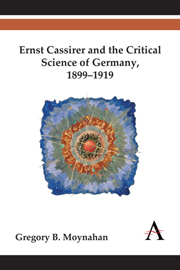Book contents
- Frontmatter
- Dedication
- Contents
- Acknowledgments
- List of Abbreviations
- Introduction “Reading a Mute History”: Ernst Cassirer, the Marburg School and the Crises of Modern Germany
- Part I The Marburg School and the Politics of Science in Germany
- Part II Critical Science and Modernity
- Part III Liberal Democracy and Law
- Conclusion Critical Science, the Future of Humanity and the Riddle of An Essay on Man (1944)
- Index
Conclusion Critical Science, the Future of Humanity and the Riddle of An Essay on Man (1944)
Published online by Cambridge University Press: 05 September 2013
- Frontmatter
- Dedication
- Contents
- Acknowledgments
- List of Abbreviations
- Introduction “Reading a Mute History”: Ernst Cassirer, the Marburg School and the Crises of Modern Germany
- Part I The Marburg School and the Politics of Science in Germany
- Part II Critical Science and Modernity
- Part III Liberal Democracy and Law
- Conclusion Critical Science, the Future of Humanity and the Riddle of An Essay on Man (1944)
- Index
Summary
Cassirer's work before the First World War set out the conditions for a new form of liberalism specific to central Europe and the development of the modern sciences, one based on a historical critique of knowledge revealing different definitions of subjectivity, objectivity and meaning for different eras. This form of liberalism was expressly different than that of other Western European traditions since it was rooted in Leibniz's philosophy, which had developed a political theory of rights, liberalism and democracy that Cassirer considered, remarkably, superior to that of Locke, Montesquieu or Rousseau. Rather than simply defending a liberal vision of the individual as enclave, Cassirer's liberalism aimed to develop a continuous critique of all forms of knowledge, and with them the development of all forms of sociation and reality. From this critical project, new forms of institutions and ideals could be developed that were more durable, more open to permutation and creative development, and less presumptuous of an essential human nature – and thus open to new definitions of human freedom – than their predecessors.
Despite his role as perhaps the most famous German liberal of the Weimar period, the original content of Cassirer's liberalism and its relation to the sciences as it developed in the imperial period, from his first studies of Leibniz through books such as Freedom and Form (1916), has remained largely undeveloped by political and social theorists. In the practice of specific disciplines, however, Cassirer's model of critical science has been widely influential, largely in a manner removed from his original liberal project and its Wilhelmine context.
- Type
- Chapter
- Information
- Ernst Cassirer and the Critical Science of Germany, 1899-1919 , pp. 209 - 220Publisher: Anthem PressPrint publication year: 2013

